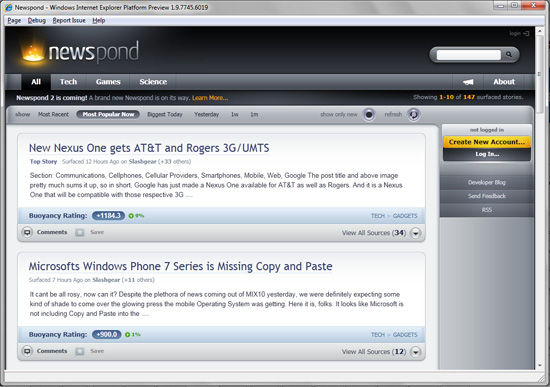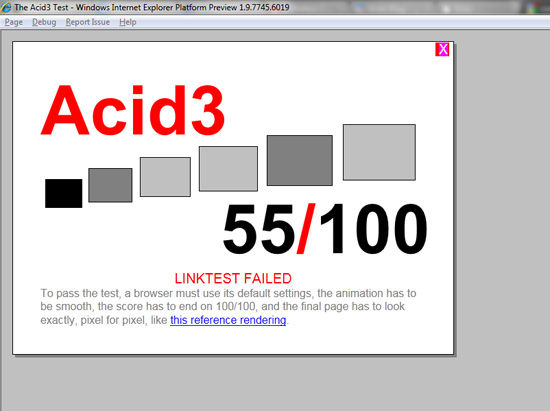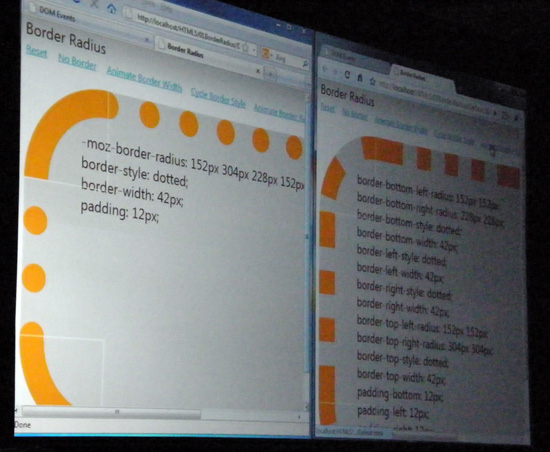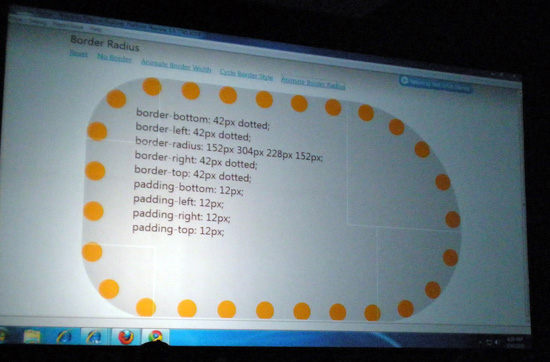Internet Explorer 9 Platform Preview: Investigated
by Brian Klug on March 17, 2010 11:44 AM EST- Posted in
- Trade Shows
Standards Compliance
That aside, virtually everything else works the way you'd expect it to. The few number of sites I visited all appeared to load (minus a few script errors) without any obvious visual problems. Among the most intense of examples I frequent is newspond.com, which uses purely CSS to deliver what I think is one of the most haptic and interactive news aggregation websites around. It's a qualitative test, but I've found that it's surprisingly real-world.

Microsoft took a quick jab at the ACID web compliance tests during the MIX10 day 2 keynote, most notably the ACID 3 test, which it currently doesn't pass:

The IE team is busy working on making IE 9 Acid3 compliant, but noted that because the HTML5 spec is still evolving, they aren't focusing exclusively on just making IE 9 pass one test. During the keynote, Dean Hachamovitch noted, "some people use Acid3 as a shorthand for standard support. Acid3 is kind of interesting, it exercises about 100 tails of about a dozen different technologies. Some of them are under construction, others less so... we will continue to make progress on the Acid3 test. The score will continue to go up as we make more of the markup that developers actually use, work."
There's something to be said for real-world testing and taking synthetic benchmarks with a grain of salt; it's something the GPU-testing community has known and practiced for years. To that extent, IE went ahead and developed its own testing suite, which you can find at http://ie.microsoft.com/testdrive/.
Dean illustrated a compelling example showing the CSS edge pattern rendering differences between the latest builds of Chrome, Firefox, and IE 9. Note as well the browser-specific prefixing required to get near the same border patterns:

Firefox 3.6 at left. Chrome (stable) at right.

IE 9 Platform Preview
This is something you can easily replicate for yourself using the latest browsers and the test pages noted previously.










60 Comments
View All Comments
opalfroot - Monday, March 22, 2010 - link
I find it hard to get excited about something like this - I mean since ie6 MS has been the cause of most web developer's headaches. I mean this should have been ie7 - now we all have to wait for ie6, 7 and 8 to die before we can utilise these 'new' capabilities on a global scale.Its no wonder people lose faith in companies like MS - for years they have failed to deliver anything close to a good browser and now all of a sudden they expect us to whoop over what the open source community gave is 5+ years ago .
Performance might be something but so too is backwards compatability - everything upto windows 7 (default browser) will not be able to take advantage of the new capabilities and as MS knows the majority of people dont go looking for an alternative .
Being sinical - this is nothing short of a PR stunt to in the wake of being forced to openly advertise alternatives.
opalfroot - Monday, March 22, 2010 - link
Great all the features developers wanted ...5 years ago.If we want to take advantage of these already supported features in FF, Chrome, Opera etc we have to wait for ie7 and 8 to die ...great
bobbozzo - Friday, March 19, 2010 - link
If MS were actually serious about migrating everyone off of IE6, they'd release a new IE for Windows 2000.piasabird - Friday, March 19, 2010 - link
Every time Microsoft releases a browser more programs fail to work. They just dont get it. People want stability and backwards compatability. We dont need a new browser every 5 minutes that doesnt work with standard code.I wait with baited breath.
AssBall - Saturday, March 20, 2010 - link
Do you use worms or lures?*Bated
minime - Thursday, March 18, 2010 - link
It's that simple. Doesn't matter how fast IE9 is going to be.ashtonmartin - Thursday, March 18, 2010 - link
The Acid test is stupid and I wonder why review sites even bother with it. Just because you get a higher score on the test doesn't mean you can render webpages better. IE which scores lowest on the test will render more pages correctly than either firefox or chrome, especially pages that use aspx.Stas - Thursday, March 18, 2010 - link
I've been using Opera for the past 4 years, and always felt like it was a superior browser (smaller, faster, more options, tweaks, settings, features out of the box). Good to see how my assumptions are backed by the test results :)P.S. At work I use FF with about 7 extensions because of my coworker that refuses to use anything else. It's always up-to-date and tweaked. My home backup browser is Chrome - very fast (on par with Opera 10.5), but lucks in interface and functionality for me personally (plus it seems to have MORE issues with displaying websites correctly than other browsers). And I always user IE 7/8 on clients' machines. So I'm not prejudice, and I know and actively use other browsers. The only one I stay away from is Safari. It's huge, it's slow, it breaks pages all the time. Apple is Apple, and I know better than to use their products :)
Thanks for the article!
vailr - Thursday, March 18, 2010 - link
Wonder if Microsoft might also consider making an IE9 version for OSX 10.6, as well as for Windows 7 & Vista?Maybe even get over their longtime disagreement with Sun (now owned by Oracle) and include the latest Java version within Windows 7?
Xenoterranos - Thursday, March 18, 2010 - link
That bare bones shot looks exactly like my stripped down version of FF at work :)